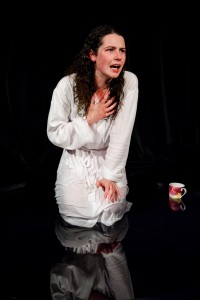Originally published as a paperback, Ross & Rachel is a tightly written tour de force for Molly Vevers, who easily modulates between “he” and “she” in this fast-paced drama. Fritz raises a number of questions and challenges about being in a relationship from the moment two people meet and how they interact with others at a party. Imagine a couple, not so much as individuals but as a couple conversing with others, practically talking over each other in side-by-side dialogues.
“How long have you two been together now?”
“You’ve still got that look about you.”
“Did you ever hear how we first met?”
“Right from the first moment I saw her, standing next to my sister, I knew.”
“Not now, honey.”
“Strap yourselves in, you’re not gonna believe this story.”
“They don’t want to hear about that.”
“You guys think that’s good? Tell them about how we got back together. She tells it better than I can.”
Vevers delivers this type of dialogue consistently for nearly 60 minutes. She is quite good in this challenging role, especially as the subject matter evolves into difficult, almost unimaginable events. A number of inquiries are examined and played out. Where does “I” end and “you” begin? Just how much will women often give up to be in relationship? Is it true that any man is better than no man? Does “until death do us part” really mean what it says?
Fritz wrote the male character as a typical guy. However, a revelation of an illness he has leads to a demand of her that seems hugely selfish. But the "Ross" character (those names are never heard throughout the work) doesn't seem written egotistically enough to warrant her acquiescence to his request. Or is she just mad?
Vevers begins the performance dressed only in a white cotton waffle-weave spa robe, holding a cup of tea and sipping from it casually as if to have a chat. Eventually she pours the remainder into the shallow pool she is standing in. She then fills the cup from the pool and proceeds to drink from it three times, spitting out the rancid water each time. Cringeworthy, but to what end? The action yanked the focus from the dialogue.
The design elements don’t help much. The lighting design by Douglas Green don’t live up to Vevers’ performance. Lighting appears as an afterthought—almost nonexistent light and a strand or two of twinkle lights hang overhead. Only at one point was the light dramatic enough to complement the brutal dialogue—when Vevers is lit crosswise, creating two distinct shadows on opposite walls. Alison Neighbor has designed a set featuring a shallow, round, black pool of water—which Vevers never leaves after the first 10 minutes or so—surrounded by eight votives on the floor.
To complete the play, director Thomas Martin has Vevers clap three times. The lights go to black, as if it were the “Clapper” lighting commercial or Jeb Bush begging an audience with “You can clap now.” Cue music. Vevers is too fine an actress and the dialogue too complex to incorporate silly moves and allow for a nonsensical set design—it’s unnecessary and distracting.
Ross & Rachel is strong and powerful, and it demands attention, and Vevers brings the words alive. What is striking is her drive to connect with each audience member, most telling in a monologue about coffee. She has a manner and a presence reminiscent of fine actresses from another era. This is her era, her time.
Ross & Rachel is part of Brits Off Broadway at 59E59 Theaters (59 East 59th St., between Park and Madison Avenues). Performances run through Sunday, June 5. Evening performances are at 7:30 p.m. Tuesday through Thursday and 8:30 p.m. Friday and Saturday; matinees are at 2:30 p.m. Saturday and 3:30 p.m. Sunday. Tickets are $25 ($17.50 for 59E59 members). To purchase tickets, call Ticket Central at (212) 279-4200 or visit www.59e59.org.








